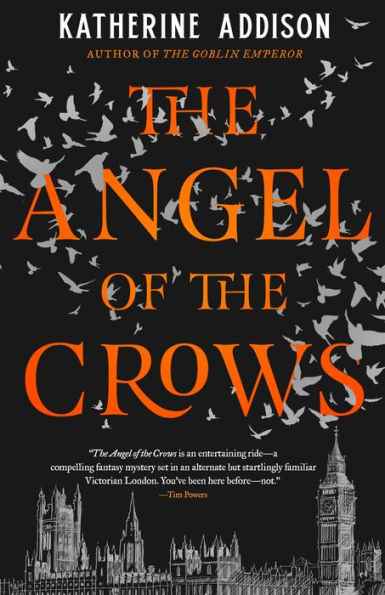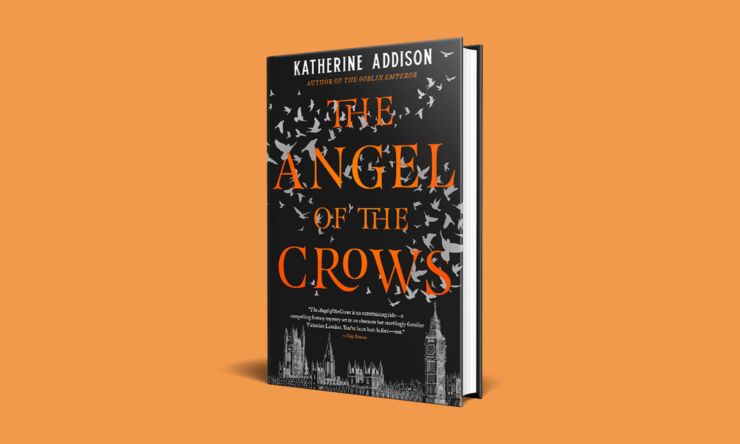Dr. J.H. Doyle, late of Her Majesty’s Imperial Armed Forces Medical Corps, knows he’s not an easy person to live with. He’s sullen and pedantic at the best of times, and he’s still reeling physically and financially from an injury suffered at the hand (claw) of a fallen angel in Afghanistan. Add to this his increasingly worrisome transformations during the night and, well, finding a roommate that can put up with him is maybe more trouble than it’s worth. But then, Doyle meets Crow, an angel as artless as he is enigmatic, and finds himself drawn inexorably into his orbit. And he doesn’t just get a roommate out of the deal—Crow brings with him a host of London’s dark and uncanny creatures, not to mention a slew of mysteries that will bring them closer and closer to the doorstep of the infamous killer Jack the Ripper.
Yes, Katherine Addison’s new novel, The Angel of the Crows, is supernatural Sherlock fanfiction (wingfic, to be precise). She’s not hiding it either—it’s right there in the author’s note, and undeniably written into every other character name, easter egg, and case file. And the sooner you embrace this sincerely dorky premise, the sooner you can get to all the fun.
Set in an alternate 1880s London, The Angel of the Crows follows Crow—our Sherlock stand-in—and Doyle—our dear Watson—as they solve a series of oddball mysteries about town. Fans will recognize stories like “A Study in Scarlet” and The Hound of the Baskervilles, as well as characters like Moriarty (he’s a vampire now) and Lestrade (still a lesser mortal) in its pages. The catch is not only the novel’s supernatural entities and phenomena, but also the ways that these distortions change the once-familiar stories into something new. How, after all, will Hound of Baskervilles be changed by the quite literal existence of hellhounds? What fun is there in a mystery that can be solved by a psychic or a soothsayer? These aren’t simple deus ex machina (a ghost did it!) but a set of new rules to be applied in Crow’s deductive reasoning, a toolkit of lore, esoteric cultural knowledge, and occult psychology. You may know the outcomes of these stories in a general sense—but you’ve also never read stories quite like them. Add to this the uniting narrative of the Ripper case, and you’ve got yourself a Victorian mystery remix the likes of which I haven’t seen since steampunk’s heyday.
Buy the Book


The Angel of the Crows
The existence of angels and werewolves and etc. are not the only revisions at play in the novel. I should say, first, that I have described it as fanfic of Sherlock of late BBC fame rather than Doyle’s original Sherlock Holmes stories because it draws clear story beats and charming allusions from and to its episodes. These subversions delighted me almost as much as the spooks and creatures. Crow tells Doyle that he values his opinion and intellect, for instance, and treats him as a partner rather than a hanger-on. This allows for a much different kind of relationship to develop, not to mention the growth it lends to each of their character arcs. As someone that was ultimately disappointed in BBC’s Sherlock (and here’s why), it was a pleasure to read a kinder, more developed version of these characters that didn’t sacrifice the thrill of deduction and a protagonist much smarter than his readers.
Note: Spoilers below!
Of course any review of Angel of the Crows would be incomplete without acknowledging its subversion of gender as well. Not only do we have a trans Watson/Doyle and an ambiguously gendered Holmes/Crow, but we have these delectable things without them mattering a single lick to the plot itself! No melodramatic outing, no overwrought transition backstory, just awkward transmasc energy for days. Their treatment of Doyle’s identity as a surprise/reveal may turn some readers off—which, fair enough—but as a trans reader myself, I loved being fooled into misinterpreting Doyle’s transness as a wolf/hound transformation (trans guys are werewolves; don’t ask me to explain myself), and I loved that there was no real “reason” for the reveal, it was for its own sake. It’s nice to have a story featuring a trans character that doesn’t focus on their transition or their pain.
All of that being said, there’s quite a lot in Angel of the Crows that exists for its own sake and that did ultimately leave me feeling less in love than I otherwise might have been. There are moments where the fourth wall is—maybe not broken, but certainly questioned—and where canonical material is referenced in a rather leading way, and I often felt as if these moments were going to build into some kind of meta-commentary or universe-bending reveal—something otherwise bigger than the mystery stories in-and-of themselves. But the novel just… never goes there. It is very much just itself. You get what you paid for.
And I like what I paid for. The novel is utterly bizarre, for one thing. The stories are amusing and thrilling, and they fully function as the pastiches of Victorian story-telling that they aspire to. The heroes are the best sort of charmingly-flawed outcasts, and I could go on for days about what a sweetheart this interpretation of Sherlock is. But—especially as a novel, not as a collection of disparate stories—there could have been more meat to it, more substance, more to say. Besides not doing anything to break the form, timeline, or narrative, there aren’t any real themes so much as motifs—various instances of the harm of gender roles and imperialism, but no throughline of commentary. It bothered me less in the heat of the reading process, and more in hindsight and in the final 20 pages or so, which was when I expected the motifs to be brought together somehow. The resolution of the Jack the Ripper case certainly didn’t prove enough of a unifier, however riveting its final scene may be.
Perhaps it’s a problem of form. If this had been presented to me as a collection of stories, I might not have had the same concerns. And—I’ll be honest—if I’d read it on AO3, I probably wouldn’t either. But regardless of what form it might take, I’d absolutely read a sequel to The Angel of the Crows (Addison certainly leaves room for one). There’s a reason these characters and stories are so enduring, after all, and these reimaginings only add to the delight.
The Angel of the Crows is available from Tor Books.
Em Nordling reads and writes in Louisville, KY.










